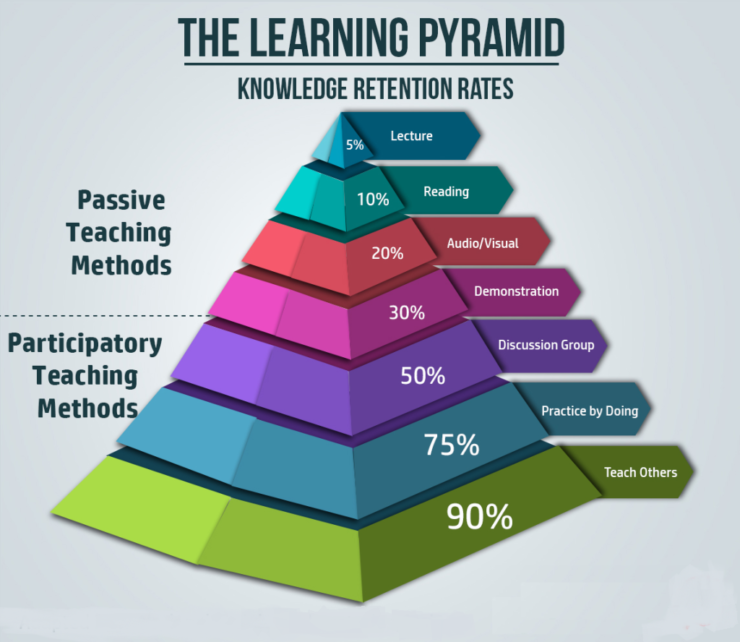Almost all of us waste 90% of our time, resources, and learning time because we don’t understand a simple concept called the Learning Pyramid. The Learning Pyramid was developed way back in the 1960s by the NTL Institute in Bethel, Maine. And if you look at the pyramid you’ll see something really weird.

Learning pyramid
A learning pyramid is a group of popular learning models and representations relating to different degrees of retention induced by various types of learning. The representations are generally via percentages and discrete layers within a “pyramid of learning“. The divide is generally 10, 20, 30, 50, and 90 percent.
- 90% of what they learn when they teach someone else/use immediately.
- 75% of what they learn when they practice what they learned.
- 50% of what they learn when engaged in a group discussion.
- 30% of what they learn when they see a demonstration.
- 20% of what they learn from audio-visual.
- 10% of what they learn when they’ve learned from reading.
- 5% of what they learn when they’ve learned from the lecture.
Why do you retain 90% when you teach someone else or when you implement it immediately?
There’s a good reason why. When you implement or teach, you instantly make mistakes. Try it for yourself. So as soon as you run into difficulty and start to make mistakes, you have to learn how to correct the mistake. This forces your brain to concentrate.

What your brain hears or sees is simply an abstract concept. And no matter how clearly the steps are outlined, there is no way you’re going to retain the information. There are two reasons why.
Reason 1: Your brain gets stuck at the first obstacle.
The only way to understand is to pick up a book, watch a video, or listen to the audio. Any book, any video, any audio. And you’ll find you’ve missed out at least two or three concepts in just the first few minutes. It’s hard to believe at first, but as you keep reading the same chapter over and over, you’ll find you’re finding more and more that you’ve missed.
This is because the brain gets stuck in the first new concept. It stops and tries to apply the concept but struggles to do so. But you continue to read the book, watch the video or listen to the speaker. The brain got stuck at the first point, but more points keep coming. And of course, without complete information, you have ‘incomplete information’. Incomplete information can easily be fixed by making the mistake first hand.

Reason 2: Your brain needs to make the mistake first hand
No matter how good the explanation, you will not get it right the first time. You must make the mistake. And this is because your interpretation varies from the writer/speaker. You think you’ve heard or read what you’ve heard/read. But the reality is different. You’ve only interpreted what they’ve said, and more often than not, the interpretation is not quite correct. You can only find out how much off the mark you are by trying to implement or teach the concept.

“Study Less, Study Smart” from psychology professor Dr. Marty Lobdell.
- • Study in chunked sessions: Your ability to retain information diminishes after about 25-30 minutes, so break it up into multiple, smaller sessions. Reward yourself with fun activities during your breaks
- • Have a dedicated study area: Don’t study where you do anything else. Don’t study in your bed, where you play games (even if it’s your computer), or in front of the TV.
- • Know the difference between recognition and recollection: Recognition requires a trigger for you to remember something and you may not get that on a test. Study actively with a focus on recollection. Quiz yourself and don’t just glance over-highlighted notes.
- • Take good notes: Find a note-taking method that works for you and expand on them after your class lecture to increase retention and understanding.
- • Be ready to teach what you’ve learned: If you can teach it to someone else, you have a solid grasp on the material.
- • Read textbooks effectively: Use the SQ3R Method—survey, question, read, recite, review—to actively retain information. Just reading it is not enough
- Lastly, divide everything you learn into two categories: facts and concepts. Facts are things that can fall out of your brain and you may need to come up with a mnemonic device in order to study them. Concepts are the glue that holds the entire big picture together, making them the most important part to study. Concepts are why you’re studying something, to begin with, and, once you learn them, they stick with you. Stop wasting hours studying at only a third of the pace you could be going and study smart.
Related posts:
- Hygiene that to be taken care of closely
- How to manage everything in college
- Rules and regulations against cybercrime
- Failing harder is Important for Success
- How to make use of 24 hours effectively & time management
- 5 Ways to Develop the Habit of Reading
- Ways you can boost your self-confidence
- Five Ways to Improve your English Speaking Skills




















